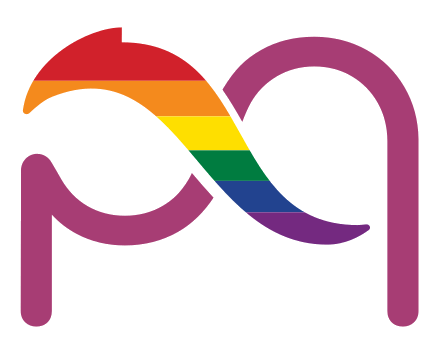PADOVA PRIDE
JUNE 30th, 2018
POLICY DOCUMENT
It has been sixteen years since the last time Padua hosted a Pride. More challenges are to be faced in comparison to those of 2002, because both the context and the LGBTI+ community (which has become more complex, diversified and able to question itself) are different.
Six are the colours on the flag that represents the LGBTI+ community, and six are the thematic areas that, during Padua Pride 2018, will be submitted to the attention of the whole city, the Veneto Region and the Italian government.
 VISIBILITY was already fundamental back in 1969, when the Stonewall riots took place. However, almost fifty years later, in many areas of society LGBTI+ people are not free either to come out or to feel at peace with their gender and sexual identity. A truly inclusive coming out is in fact impeded by discriminations that occur in workplaces, sport centres and households. Because of this, a law against homophobia is surely needed: the government and all the cities should take concrete action. They could, for instance, join the Italian network RE.A.DY. Moreover, types of identity and relationship that are not socially or legally acknowledged yet – and therefore ignored during public debates – should be taken into consideration (e.g. same-sex families or polyamory). At the same time, more attention should be given to bisexuals and asexuals to help people overcome those prejudices that impede both visibility and a fair endorsement of differences.
VISIBILITY was already fundamental back in 1969, when the Stonewall riots took place. However, almost fifty years later, in many areas of society LGBTI+ people are not free either to come out or to feel at peace with their gender and sexual identity. A truly inclusive coming out is in fact impeded by discriminations that occur in workplaces, sport centres and households. Because of this, a law against homophobia is surely needed: the government and all the cities should take concrete action. They could, for instance, join the Italian network RE.A.DY. Moreover, types of identity and relationship that are not socially or legally acknowledged yet – and therefore ignored during public debates – should be taken into consideration (e.g. same-sex families or polyamory). At the same time, more attention should be given to bisexuals and asexuals to help people overcome those prejudices that impede both visibility and a fair endorsement of differences.
This should be taken into consideration both outside and inside the LGBTI+ community
 The concept of health goes beyond mere healthcare: HEALTH has three components (physical, psychological and social) and it is strictly linked to the LGBTI+ community, in that it changes its shades when different identities and sexual orientations are taken into consideration. Institutions should acknowledge and support a community-based approach when it comes to the health of LGBTI+ people. In particular, more attention should be given to the prevention of STDs (sexually transmitted diseases) and the care of elderly LGBTI+ people. It is necessary to promote effective and ongoing campaigns of information and prevention. Furthermore, care workers should receive a specific training to get rid of prejudice towards LGBTI+ patients such as HIV-positive people and transsexuals.
The concept of health goes beyond mere healthcare: HEALTH has three components (physical, psychological and social) and it is strictly linked to the LGBTI+ community, in that it changes its shades when different identities and sexual orientations are taken into consideration. Institutions should acknowledge and support a community-based approach when it comes to the health of LGBTI+ people. In particular, more attention should be given to the prevention of STDs (sexually transmitted diseases) and the care of elderly LGBTI+ people. It is necessary to promote effective and ongoing campaigns of information and prevention. Furthermore, care workers should receive a specific training to get rid of prejudice towards LGBTI+ patients such as HIV-positive people and transsexuals.
The introduction of PrEP (Pre-exposure prophylaxis), combined with the use of condoms, should be considered to prevent HIV, especially for those at risk, such as sex-workers and males who have sex with other males (MSM). Moreover, treatments to fight HIV should become more accessible – also from an economic point of view – and campaigns should be organised to sensitise about their collateral effects.
Condoms and contraceptives should be given for free, and the same should be for the vaccines linked to sexually transmitted infections, such as Hepatitis A. Furthermore, economic discrimination based on gender should come to an end (pink tax).
The LGBTI+ community rejects each and every form of therapy that intends to ‘correct’ sexual orientation or gender identity. Intersexuality and transsexuality should not be considered illnesses, no matter the age of the person.
However, National Healthcare should still take care of them and centres specialised in change of sex should be enlarged and strengthened.
Lastly, because Padua is part of an area known for its pollution and industrialisation, ecological remedies should be looked for to improve the situation and campaigns to sensitise about the respect of the environment and the dignity of all beings should be organised.
![]() CORPOREALITY Sexuality should not be censored, moralised or perceived as solely linked to procreation. Therefore, pleasure and desire should be free, as long as consensual partners are involved.
CORPOREALITY Sexuality should not be censored, moralised or perceived as solely linked to procreation. Therefore, pleasure and desire should be free, as long as consensual partners are involved.
Dignity and value should be given back to bodies and individuals. In particular, transgender and intersexual people should be free to self-define themselves and to go under surgery without having updated their personal data. Moreover, a debate should be started from the LGBTI+ community about minor trans* and their self-definition in a preadolescent phase. Clause 85 of the Laws about public security should be modified: someone who intervenes on the physical appearance they were born with to make it correspond to their gender identity should not be punishable. At the same time, institutions should give people the chance of a third choice when information about gender is required on a document.
The LGBTI+ community is ready to fight gender discrimination in itself and in all its forms – physical, psychological and economic violence. Therefore, a law that guarantees wage equality similar to the one that has recently been approved in Ireland should pass; men and women should have equal opportunities and rights in workplaces, so that the discriminations against women when it comes to parental leave might come to an end.
Other people that should be trained about gender violence and discrimination are those who work in environments established to protect people (courthouses, police departments, hospitals).
The right to fully live sexuality should include those with a physical or mental disability: an assistant specialised in sexuality would be helpful in this kind of situations.
Lastly, our community – and male gays in particular – should let go of the dangerous obsession with physical appearance and masculinity. Everyone should reflect upon how much self-inflicted suffering can be triggered by the hostility against imperfect bodies (body shaming) and effeminacy (femme shaming).
 An open-minded society knows that FREEDOM and SECULARITY are deeply connected.
An open-minded society knows that FREEDOM and SECULARITY are deeply connected.
In Padua and in Veneto, where pluralism is considered essential, it is believed that topics such as abortion, artificial insemination, same-sex families and transition should be discussed in a religion-free environment, with no prejudices involved.
Therefore, and as established by the Law 22 March 1978, a voluntary interruption of pregnancy is to be granted to allow conscient and responsible acts of procreation. At the same time, Law 40/2004 should be either abolished or modified, so that singles and couples – even same-sex couples – can have access to medically assisted procreation and conception through surrogate motherhood.
In a truly laic State, every kind of family should have equal rights; therefore, institutions should intervene to do something concrete about same-sex families and co-parenting.
Considering the law that passed about Civil Unions (71/2016), further steps should be taken to obtain equal rights where marriage is concerned: marriages signed abroad should be considered valid in our own country and those who got married before changing sex should be safeguarded.
The Regional Board of Veneto should abolish motion 270 (2014), which effectively discriminates every family that is not based on a marriage between a man and a woman. On the contrary, motion 4 (2010) should pass to prevent and fight every kind of discrimination linked to sexual orientation and gender identity.
Institutions should set up moments of discussion about topics such as the end of life and the regulation of prostitution. Moreover, valid alternatives should be provided in public schools for those who do not study Catholic Religion.
Since it has already been done in Pavia and Turin, the city of Padua should modify those rules that do not explicitly stop people from exhibiting Fascist or Neo-fascist flags or symbols in public spaces. In addition to this, images or messages that promote and encourage any form of discrimination should be prohibited.
 To prevent homophobia, experts in the matter of EDUCATION should take action, particularly when kids and pre-adolescents are concerned, in that the fear of the different, gender stereotypes and heteronormativity are learnt when someone is still a child.
To prevent homophobia, experts in the matter of EDUCATION should take action, particularly when kids and pre-adolescents are concerned, in that the fear of the different, gender stereotypes and heteronormativity are learnt when someone is still a child.
Considering what can be read on newspapers every day, to prevent any form of violence the idea of consensus should be effectively taught and promoted, starting with kids. Therefore, schools should provide a safe environment where differences are explained and awareness in both affectivity and sexuality is taught.
To prevent bullying and discriminations, teachers should undergo a specific training to be able to deal with LGBTI+ students and same-sex families.
Regarding this, the Regional Board of Veneto should abolish motion 13 (2015), which instigates fear and obscurantism under the pretence of prohibiting ‘destabilising’ ideologies.
Universities should make sure that transgenders receive paperwork and exam transcripts that respect their gender identity.
Since history is a fundamental part of our identity, an education worth of this name should defi ne antifascism as a pivotal value for society. Therefore, students of all ages should be taught to reject any form of intolerance and justification of violence.
Because of the deep connection between identity and memory, the historic and cultural process that led to the foundation of the LGBTI+ community should not be forgotten, and the same goes for the victims of violence – in particular, those who where persecuted during the Homocaust.
Regarding this, the municipality of the city of Padua should include the LGBTI+ victims among those who are honoured during the celebrations held for the International Holocaust Remembrance Day. Moreover, a plaque in their honour should be affixed in the National Temple of the Unknown Prisoner – which is in Padua – or in other similar locations.
 Every demand of acknowledgement for sexual identities should be perceived from an intersectionality perspective. Therefore, other subjective characteristics – such as ethnicity, census, social role, language, geographical origin – should be enhanced.
Every demand of acknowledgement for sexual identities should be perceived from an intersectionality perspective. Therefore, other subjective characteristics – such as ethnicity, census, social role, language, geographical origin – should be enhanced.
Because of the recent, international geo-political changes, every urban space should provide services for both individuals and communities; those in need of recognition need to be taken care of and differences have to be positively perceived. In addition to this, a complete and sincere INTEGRATION/INCLUSION in the social environment is to be looked for.
Things should change both locally and nationally: what is needed is an enlargement for the structures that accommodate LGBTI+ migrants and asylum seekers, women and minors who were victims of trade, LGBTI+ homeless people and victims of family abuse.
To avoid episodes of alienation, a work of prevention is truly needed, and it needs to happen through scholastic integration and the promotion of an interreligious and intercultural dialogue.
Furthermore, the government should take these themes in consideration and, even more important, a law should pass to guarantee citizenship rights for ius soli to all those who are or were born in our country.
Lastly, the LGBTI+ community itself should get rid of those stereotypes and prejudices that prevent an actual integration from happening.
